Shut Up & Read discussion

This topic is about
Home
 Sucked in by a force, I'm flying through a tunnel
Sucked in by a force, I'm flying through a tunnelThe tunnel of memory that leads me back home
The past blurs my present, so my vision is double
Walls of my childhood curve into a dome
From here I can see that home, tilting
And falling from place, all the lamps are aflame
My father's empty chair is slowly ascending
Tipped by the light, outlining its frame
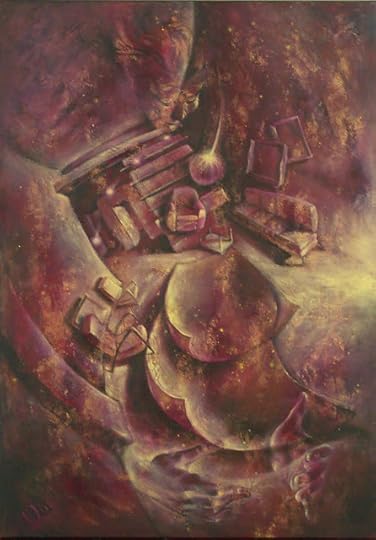
For this oil painting, I prepared the canvas with a layer of textured bronze color, then worked the scene into it. The early sketches for the composition were done on a small note of paper on the first day of the Shiv-aa, the mourning period following my father's death. By the time I came back home the note was lost, so I re-sketched it from memory.
This poem is included in my poetry book, Home.
 Home is a vessel holding poems and prose in tribute of my father. I spent an entire day working on the design of the front cover:
Home is a vessel holding poems and prose in tribute of my father. I spent an entire day working on the design of the front cover:
The image may look familiar to you, I have showcased it in My Father's Armchair, and offered closeup details, in association with my poems Muse and This is the Place. However, I needed a higher resolution image for the front cover, which presented a real challenge. It is extremely difficult to photograph this piece, because the layer of gold, which is exposed in places, reflects light in unpredictable ways. So I snapped the picture in one room, then another, with diffused daylight coming from the side, the front, the top, with and without flash, then took it outside and snapped it in sunlight, in the shadow, here, there and everywhere... You get the picture.
At last I found one version that looked fine to me. First I had to fit the image to a prescribed size (according the book size I have in mind.) Then I created the shadows of the lettering. You may notice that the shadow's color is not black, but rather it is the darkest purple of the painting (which can be seen in the lower left corner.) Also, I blurred these shadows, so they do not have hard edges, but fuzzy ones. Then I selected a soft yellow, with which I typed the title, Home; and a less bright version of this yellow, with which I typed my name and my father's. Being brighter, the title 'comes forward' in relationship to the author names.
Normally I would make sure that all text fields are of the same width, or that they are arranged in a way that the one on top has the shortest width, and the one at the bottom has the longest width, which creates a sense of stability. Not so here, because I view my childhood home through the shaky lens of memory...
Take a 'Look Inside' and read the reviews
Give yourself a gift:
Download these highly praised ★★★★★ ebooks:
http://tinyurl.com/home-ebook
http://tinyurl.com/apartfromlove-e
http://tinyurl.com/my-book-links
 Oh what is there to say
Oh what is there to sayCome Valentine's day?
You bring a dozen blood-red roses
She thinks, Is this how he proposes?
With a bottle of wine
You whisper, Be mine
You offer a big chocolate heart
She thinks, Well, that's a start
She loosens your tie
And gives a deep sigh
The fire is burning, the music is on
But all you can see on her face is a yawn
Then from your pocket you pull out the ring
She shakes her head, No, I want one more thing
What does she want, come Valentine's day?
In cupid's name, what should I say?
She smiles, Bring me Home, Apart From Love
Then I'll be yours, like a hand and a glove
And you say, Give me A Favorite Son
Now let's blow off the candles, one by one
What more is there to say
Come Valentine's day?
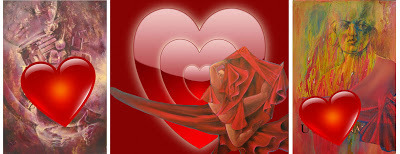
Inspiring Stories, Great Performances
A Favorite Son
Now in print, ebook and audiobook!
Apart From Love
Now in print and ebook. Audiobook coming soon!
Home
Now in print and ebook
 My friend, the amazingly talented Australian artist and the author of Sydney's Song Ia Uaro ordered my poetry book from Amazon, as an end-of-the-year gift for Dr Rada, who is a Polish Jew and--get this!--became fascinated with Japanese at an early age, and now teaches the language. The Aussie-Japanese-Polish connection. How neat is that!
My friend, the amazingly talented Australian artist and the author of Sydney's Song Ia Uaro ordered my poetry book from Amazon, as an end-of-the-year gift for Dr Rada, who is a Polish Jew and--get this!--became fascinated with Japanese at an early age, and now teaches the language. The Aussie-Japanese-Polish connection. How neat is that! Ia shared with me the image of Home as it arrived at her place! Here is how it hangs 'down under':
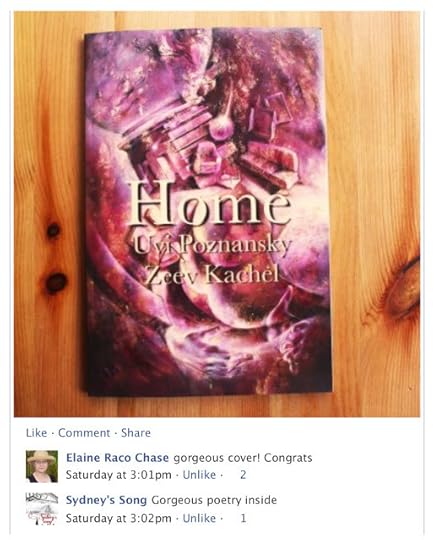
On a different note, the reference librarian in Santa Monica Public Library wrote this to me:
"Thank you for contacting the Santa Monica Public Library about the book, Home. Our materials selection staff has decided to add this title to the collection. Please be aware it can take several weeks before added items are available for checkout."
 "She locked herself in and started writing letters, some of which were never sent, for fear of revealing too much of her loneliness. Other letters she embellished along the margins, with a hand heavy with years but with the manner of a schoolgirl: She embellished them with pink flowers and long sequences of X’s and O’s for kisses and hugs, and then she sent them to that foreign sounding address, so that her grandchildren, who rarely came to visit, would know she loved them.
"She locked herself in and started writing letters, some of which were never sent, for fear of revealing too much of her loneliness. Other letters she embellished along the margins, with a hand heavy with years but with the manner of a schoolgirl: She embellished them with pink flowers and long sequences of X’s and O’s for kisses and hugs, and then she sent them to that foreign sounding address, so that her grandchildren, who rarely came to visit, would know she loved them.How would a doorknob feel to be barely touched, its latch rarely released, the lock always bolted shut? How would it feel to be in the grip of rust?
She glanced at the doorknob. Would it retain a memory of her touch, even when she is gone? Would it keep, in its own transparent ways and despite all that polishing, the layers upon layers of all their fingerprints?"
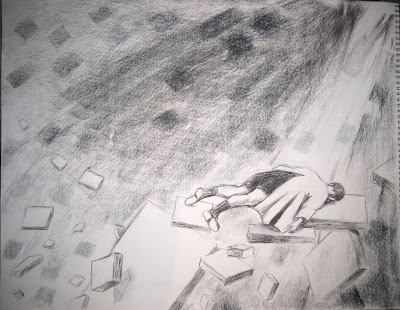
To read more, click the link:
http://uviart.blogspot.com/2012/11/xs...
 In my story A Heartbeat, Reversed, Edna peers inside a cabinet, and deep down on the bottom shelf she discovers a box. She pulls it out, lifts the flap, and then she can already sense what lies there, covered under the obscure plastic wrap. Perhaps she should avoid unwrapping the thing. It is a silent movie projector, which later in the story allows her to rewind back time.
In my story A Heartbeat, Reversed, Edna peers inside a cabinet, and deep down on the bottom shelf she discovers a box. She pulls it out, lifts the flap, and then she can already sense what lies there, covered under the obscure plastic wrap. Perhaps she should avoid unwrapping the thing. It is a silent movie projector, which later in the story allows her to rewind back time. Now Edna recalled how the very act of projecting had been a special ritual, a special game for her: Watching the reels turn, listening to the sound they produced, gauging the contrast between the blackest black, the whitest white—and above all, playing with different speeds, both forwards and back. It made her marvel at how the brain would merge separate images, to create the illusion of motion.
Giddy with excitement, Edna carried the box to the living room. She used her elbow to clear the coffee table and then, very carefully, set it down. Inside, tucked under the machine, she found two reels: One empty, the other heavy with celluloid. The filmstrip rolled down her fingers. Thrilled at the familiar touch, the touch of perforations, she threaded it as best she could, up and down through several guides, until it locked into place. Then, aiming the projector at the wall, she fired it up.
By the end of the story, something starts happening to her. When her husband Ethan comes back home, we see the scene through his eyes.
He entered the living room and at first glance all he could see, in the ghastly light of the projector, was celluloid; clips and clips of celluloid snaking, curling one over the other, all over the coffee table, all over the floor.
“Edna?” he cried.
He bent over to turn off the machine, and it was there—in the darkest dark, right under that beam of light—that he stumbled over her. He brushed away the celluloid and, guided by nothing more than a sense of touch, passed a hand over her forehead, her eyelid, her ear, trying to piece together how she looked, and what had happened here.
“Wake up, babe,” he whispered.
Her breathing was barely audible. He took a guess—by the grip of her fingers over her nose, and the subtle movement of her cheeks—that she was hiding a smile. Was it a game? Was she toying with him?
It is through his eyes, ears and fingers that we will be led to the final discovery.

The story appears in full on the pages of my poetry book, Home.
 ★★★★★ review: "For me, traditional poetry is an expression of the subconscious feelings through mundane means of imperfect words. As such, the simpler are the words the poet manages to beat into the confines of a rhyme, the higher is the mastery of this poet..."
★★★★★ review: "For me, traditional poetry is an expression of the subconscious feelings through mundane means of imperfect words. As such, the simpler are the words the poet manages to beat into the confines of a rhyme, the higher is the mastery of this poet..."Review by Oleg Medvedkov
 Be still, poet's heart, this moment is rare
Be still, poet's heart, this moment is rare Stop this hammering, why would you dare
To set up a challenge, to write your own fate
Be still and accept, perhaps it's too late
Unlucky the number, unlucky the day
Still, welcome the future, come what may
Set yourself free, apart from love
Change whatever was decreed from above
Sing out a ballad of passion and hate
Sing it out as you drown, and ignore that date
Someone may notice, may listen out there
So quicken the pounding, sing out with a flair
The flood is abating, release the dove
Pray to find yourself a part of love
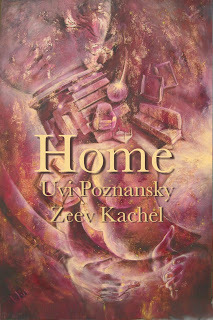
 Come one, come all! Cast your vote in the writing contest!
Come one, come all! Cast your vote in the writing contest! Beautiful writings about love. Which one deserves to win?
Vote HERE

 Author Brian Bigelow, originally from Minnesota, currently lives in Colorado with his wife, a cat and a very protective Chihuahua. I find it so rewarding to find his short and sweet review for my poetry book, Home:
Author Brian Bigelow, originally from Minnesota, currently lives in Colorado with his wife, a cat and a very protective Chihuahua. I find it so rewarding to find his short and sweet review for my poetry book, Home:★★★★★ Excellent collection., May 17, 2013
By Brian Bigelow "Brian Bigelow" (Colorado Springs, CO USA) - See all my reviews
(REAL NAME)
Amazon Verified Purchase
This review is from: Home (Kindle Edition)
I've had a copy of this book since November and finally was able to get to reading it. This is an exception collection of poetry and prose. Thought it was quite wonderful as I was entranced in the verse. Would recommend it to any poetry lover.
 Did you notice the new slideshow feature on my blog? Right at the very top?
Did you notice the new slideshow feature on my blog? Right at the very top?If you are reading any one of my books--Apart From Love, Home, or A Favorite Son (in either Kindle or print edition) I will gladly feature your image here!
To learn more, click here: Your Image at the Very Top!

 Lia London, the author of full-length novels in a variety of genres, has invited me for a second mini-interview on her site, Clean Indie Reads. Her questions focused this time on my poetry book Home. She also posted her own review of the book, and a review by Hall of Fame Amazon reviewer, Grady Harp:
Lia London, the author of full-length novels in a variety of genres, has invited me for a second mini-interview on her site, Clean Indie Reads. Her questions focused this time on my poetry book Home. She also posted her own review of the book, and a review by Hall of Fame Amazon reviewer, Grady Harp:"There are vignettes, streams of poetry, and scenes of such exquisite depth and beauty that I found myself taken aback at the skill of the writing and the power it had to touch my heart."
--Lia London, author
"This radiant book is an exploration of the bond between a daughter and father and the book overflows with some of the most eloquent poetic moments in print. Home is an invitation, a very personal one, and should not be passed over."
--Grady Harp, Hall of Fame reviewer for Amazon
Check it out here: Home
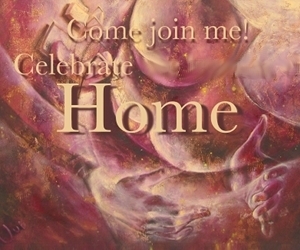
 I am so grateful for the second opportunity to be featured on Brian M. Hayden's blog! He is a dear friend, and the author of home/Road To Transplant (and more books) where he takes you along to witness the final mile on his incredible journey to a heart transplant.
I am so grateful for the second opportunity to be featured on Brian M. Hayden's blog! He is a dear friend, and the author of home/Road To Transplant (and more books) where he takes you along to witness the final mile on his incredible journey to a heart transplant. This time, my guest post focused on the opening poems in my book, Home. These poems, and the entire book, is in tribute of my father:
To read more, check it out: Guest Post by Uvi
 I plucked a wildflower
I plucked a wildflowerA poem by my father, published posthumously
I plucked a wildflower from my resting place
And it was blue, as if it wore my name, my face
But I was startled suddenly by a snake
Who slinked across the path with one tail shake
I plucked a wildflower from my grave, behind
And in silence, my daughter came to mind
Where are you now? The wave swept you away
In a velvety evening, an eve of dew and ray
I was penetrated by a pouring rain
And for a moment, somehow, I felt alive again
Sensing me, the worms began to rave
I plucked a wildflower from my grave.
And a chorus of crickets kicked off a singsong
Climbing up the wall I danced away, so long!
There's no death in life, no need to feel so sad,
I would've come back already if it were all that bad
There were a few I didn't know among the mourners
I asked myself where they came from, what far corners
The crowd was small, such pity! Some were sad
To those who cried, I smiled and waved a tad.
I left countless bills behind me, heavy debts
Come over, I'll pay them back, you bet!
I stare at you across the big divide
With obvious advantage: no interest on this side

★★★★★ bookreview: "HOME is an homage to her father...
poetry that's never been placed before the public until now"
Looking for a great Father's Day gift?
Get the beautiful print edition
Home
 When I posted the front cover of my upcoming book, Home, a reader wrote to me saying she was so ready to read it! So I worked as hard as I can, designing the back cover. While the image on the front is based on my oil painting, the one on the back is conjured out of thin air... Here three snapshots I took of the design process:
When I posted the front cover of my upcoming book, Home, a reader wrote to me saying she was so ready to read it! So I worked as hard as I can, designing the back cover. While the image on the front is based on my oil painting, the one on the back is conjured out of thin air... Here three snapshots I took of the design process: 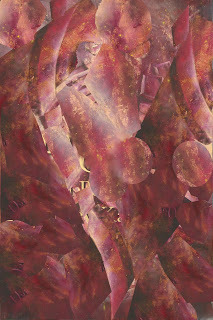
Using gimp (a program with capabilities similar to Photoshop) I cut and pasted segments from the image for the front cover, creating a 'collage' on screen.
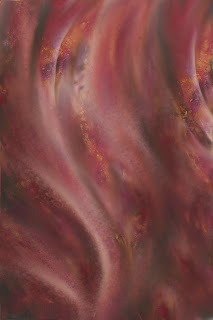
Using virtual 'brushes' of various sizes and bristle signatures, I painted the over the collage, so it became as textured and its lines as curvy as the front cover. I softened the sharp lines, so they do not 'steal' your attention away from the text to be displayed on top. Thus, I made it a 'smoky' atmosphere, that complements the home image on the front cover.

Then I took time off to compose the blurb. Once I was happy with it, I created the text shadows, which are not black but rather the darkest purple in the image. I blurred these shadows, to soften their hard edges. Then I created the text that appears over the shadows. (When text appears over an image that is highly textured, it is important to present any text over a layer of shadow, which helps separate the letters from the image.)
♫ °˚˚ ✿*‿*) ♡♥ ◦°˚˚
Love the music of words?
Treat yourself to a gift! Download Home
 I am truly honored to announce that a prolific performer, Katy Bell Denton, will be reading the poems and prose for the audiobook edition of my poetry book, Home. Since this book is in tribute of my father, the challenge for her is to express my voice in the first half of the book, and his voice in the second.
I am truly honored to announce that a prolific performer, Katy Bell Denton, will be reading the poems and prose for the audiobook edition of my poetry book, Home. Since this book is in tribute of my father, the challenge for her is to express my voice in the first half of the book, and his voice in the second. Kathy is a singer, acting coach, and voice over artist. You can view an impressive list of her film and theatre roles, here: Now Casting.
Her regional credits include work at International City Theatre (StageScene Award), The Old Globe, Kennedy Center, The Gem (Dramalogue Award), Sierra Rep and four seasons with Ensemble Theatre of Santa Barbara. Local credits include Sacred Fools, The Classical Lab, The Odyssey, Theatre West, The Unknown Theatre, Vox Humana, Malibu SummerStage, and West Coast Ensemble. Her TV/Film credits include: My X#@%&$*&! Family, Bitch (Sundance), Hypersapien, Poor Mrs. Sobel, Kadis, I’ll Pick the Flower You Love, Appleville Eats Its all Stars.
To my surprise, I found her voice reading Sonnet 99 of the Bard. In this reading she uses her easy flowing, lovely British accent, which is only one of her many accents. First, here is the sonnet, written by the playwright and poet William Shakespeare, in which he expresses his love towards a young man.
The forward violet thus did I chide:
Sweet thief, whence didst thou steal thy sweet that smells,
If not from my love's breath? Thy purple pride
Which on thy soft cheek for complexion dwells
In my love's veins thou hast too grossly dyed.
The lily I condemned for thy hand,
And buds of marjoram had stol'n thy hair:
The roses fearfully on thorns did stand,
One blushing shame, another white despair;
A third, nor red nor white, had stol'n of both
And to his robbery had annex'd thy breath;
But, for his theft, in pride of all his growth
A vengeful canker eat him up to death.
More flowers I noted, yet I none could see
But sweet or color it had stol'n from thee.
–William Shakespeare
Now listen to her beautiful interpretation, and you will appreciate why I am so delighted to work on this upcoming project with her:
To play her voice, click here

"HOME is an homage to her father...
poetry that's never been placed before the public until now"
Download the highly praised, ★★★★★ poetry book
Download Home
Audiobook coming soon
 Just discovered a new review for Home: a big thank you to the reviewer, whose pen name SMFD stands for Suzzette Dawes, the Jamaican-raised author of The Collection, Adventures in the Courtyard, and Tortured Souls. This is what she wrote:
Just discovered a new review for Home: a big thank you to the reviewer, whose pen name SMFD stands for Suzzette Dawes, the Jamaican-raised author of The Collection, Adventures in the Courtyard, and Tortured Souls. This is what she wrote:★★★★★ a lot of emotion is shared and conveyed, June 17, 2013
By SFMD - See all my reviews
Amazon Verified Purchase
This review is from: Home (Kindle Edition)
A book with beautifully written poems and prose. It opens with a daughter writing about her father and some special memories attached to the armchair. I like the rhyme pattern and the flow of the poetry
It reveals, it unveils a clue (from Muse)
Essay - A Sentence Unfinished - is a heavy read. Uvi describes a scene where her father sitting in his armchair remembering his escapes from the Nazi to Spain to Israel. The other chapters follow with her father as a child (I guess she has heard the stories over the years). His family running from invasion during World War 1 abandoning their home town (German invasion).
With father's day just passing, there some honor in her translating her father's poems. Then there is her father's poem "Bent over Memories" reminiscing on his daughter when she was younger while looking at children playing in the park:
No longer will I carry you in my arms, little girl" and
"Now I am alone.
Supported by memories...
Sitting in the park for hours
Watching someone else's children."
Verse conveys strong feelings - daughter far away but the children playing reminds him of time spent when his daughter was younger.
Overall a good read that out pours the emotion and provides some insight on life:
"I Plucked a Wildflower" - Funny but morbid to write about own funeral, the mourners you don't know and the debt you left behind. Humor that no interest on the other side. Take that banks!
If i had to choose a favorite, it would be "We Pass" due to the contrast of fall and spring, how we are now and how we used to be (symbolized by the couple who passed embracing). Fall (when leaves separate from the trees) and fail relationship - the comparison noted.
Sorry for the spoilers but I enjoyed reading Home.
 In a dark night with not a friend
In a dark night with not a friendIn a dark night with not a friend
I walked all alone in the world
A splitting burst of thunder I heard
And sea breakers that hammered and curled.
A thunder rolled over the skies
Wind gusts battered me with a cry
Terror blinded my eyes
I couldn’t tell an enemy from an ally.
In a night with not a friend, all bleary
I could see no shelter around
I walked on, broken and weary
Searching for hope to be found
♫ °˚˚ ✿*‿*) ♡♥ ◦°˚˚
Inspired by the music of words?
Get Home
 My week on Mcv Egan's history-related blog comes to a height with a new piece, this time written not by me--but by my father. This is my all-time favorite of his work, which opens with a conversation with his counselor:
My week on Mcv Egan's history-related blog comes to a height with a new piece, this time written not by me--but by my father. This is my all-time favorite of his work, which opens with a conversation with his counselor:You're asking me to put here in writing, once more,
All that I lost, my esteemed counselor?
And just when you might expect that he is making a list of physical properties that were confiscated by the Nazi regime, the poem takes a turn: when he describes his father's gold watch, it is the entire life of his family that is reflected in the glass lids. This is what he demands to get back--not the value of the physical thing.
Check out the post here: Reparations

 Here is a short and sweet Goodreads review of Home by Brian Biglow:
Here is a short and sweet Goodreads review of Home by Brian Biglow:This is an exception collection of poetry and prose. Thought it was quite wonderful as I was entranced in the verse. Would recommend it to any poetry lover.

 While surfing my facebook groups, I found this new ★★★★★ review of Home, written today by Christoph Fischer, and posted on Amazon and Goodreads. Christoph is a high-ranking reviewer on Goodreads: #46 best reviewers #9 top reviewers. And, he is the author of two historical fiction books, Sebastianand The Luck of the Weissensteiners.
While surfing my facebook groups, I found this new ★★★★★ review of Home, written today by Christoph Fischer, and posted on Amazon and Goodreads. Christoph is a high-ranking reviewer on Goodreads: #46 best reviewers #9 top reviewers. And, he is the author of two historical fiction books, Sebastianand The Luck of the Weissensteiners. ★★★★★ Moving, July 9, 2013
By diebus - See all my reviews
"Home" by Uvi Poznansky and Zeev Kachel is an amazing and moving collection of poems and short stories.
The first half seems written by a girl or a young woman and the images she has of her late father, his place in her life, his habits and his death. The poems are about the family history and the impressions her father has left on her as well as her current life and relationships. Nowhere is it said that the poems are a reflection on Poznansky and her life but the pieces were so moving and real that it certainly felt as if they were.
Underneath this collection however is the more central theme of home,as the title gives away. Home in the geographical, temporal and emotional sense and maybe some more that I missed.
These poems and stories are most personal and moving in their character.
Halfway through we switch to Zeev Kachel, Poznansky's father and his poems which she found after his death and which she translated from Hebrew for us.
They are different in character but have similar themes. It seems as Kachel moves on in age and time his poems become more questioning, philosophical and trying to make sense of the world. As refugee he also focuses a lot of his attention on the issue of home.
The book is deeply moving, well written and contains some amazing thoughts and images and oozes with sentimentality and love.
Very touching.

 The Opening of Home
The Opening of HomeSucked in by a force, I'm flying through a tunnel
The tunnel of memory that leads me back home
The past blurs my present, so my vision is double
The walls and the ceiling curve into a dome
From here I can see my home, tilting
And falling from place, all the lamps are aflame
My father's empty chair is slowly ascending
Tipped by the light, outlining its frame
This is the opening poem from my book, Home, and the preparatory sketch for its cover, both originating from the same place, the same vision in my mind. I find it so magical that through a creative collaboration with a wonderful actress, Kathy Bell Denton, the words--and the vision--come alive through her voice.
Take a listen:
Home, narrated by Kathy Bell Denton

Longing for a place never to be found again?
Get the paperback edition
Home
Audiobook coming soon!
 On his blog, Servante of Darkness, Anthony Servante has just posted a fascinating article. It quotes the works of several poets--my work included--and then, it offers a review and analysis of each work.
On his blog, Servante of Darkness, Anthony Servante has just posted a fascinating article. It quotes the works of several poets--my work included--and then, it offers a review and analysis of each work. Anthony starts with this premise:
Let’s discuss the premise before looking at the words. It is an axiom in academic writing that poetry must speak for itself. A writer cannot interpret meaning for the reader, giving insight to his own words as if they required his presence to clarify the work’s intents. The poem must stand up to the scrutiny of the reader alone...
From my work, Anthony selected the poem Late lover, with my oil painting to accompany the poem. Check it out here:
Poetry Today: Trends and Traditions

 Muse
MuseThe lamp swings like a pendulum
Pictures sway on their nails
Then slip down the walls, leaving scratched trails
Amidst the quake, the grief, the confusion and scare
Slowly ascending is my father's armchair
And beyond all these outlines of what I see there
Beyond the sofa, the knickknacks, the old furniture
Light pours in, and it paints something new
It reveals, it unveils at this moment a clue
The clue to a presence only he could once see
A presence he longed for, because only she
Could call him back home, and envelop him so
Touching-not-touching, her hands all aglow
These pages, upon which he'll never scribble a line
Are floating out of shadows, into the shine
Only she can now read the blanks, she and no other
He's ascending into the arms of his muse, his mother.
Listen to my narrator, the tallented Kathy Bell Denton, read these lines, Here.

Love the music of words?
Treat yourself to a gift
Get Home
Audiobook coming soon
 What a wonderful, eloquent review from Deborah for my poetry book, Home!
What a wonderful, eloquent review from Deborah for my poetry book, Home! ★★★★★ Home, August 1, 2013
By Deborah - See all my reviews
The book has poems and prose from a father and daughter with two very different and distinct ways of writing but underlying the difference you see a common thread woven through them all. A thread that is the one thing we all think of differently, home.
For her father it brought a sadness and a deep sense of longing. You can feel his suffering, the pain, the changes that age can bring and nothing is glossed over. This is raw emotions that you feel in your very soul and at times its disturbing. You feel like a voyeur looking through the pages of anothers life and seeing it all unfold in your mind. There is also a sense of wanting it to be over as though life has been lived and the time is now past and the author wants to move on. Not knowing exactly what lies ahead and yet at most times welcoming it with open arms while at others he seems to want to pull back perhaps to make changes. But those moments have passed and they are now a part of his very being which in the end he seems to accept.
Uvi must have been amazed to find poems from her father that had been hidden for years. I cannot imagine what it must have been like going through those notes and pages while still grieving the loss of her father. With her emotions so very tender and raw his words at times must have cut to the very center of her being and also to have given her some joy in knowing that their time together was not over.
Through the newly found works Uvi is with her father as she works on the translation process so they are in a sense sharing those last two decades of his life in a very different way and on a deeper level.
Whereas Zeev writes his poems almost as a diary, a journal of his life, his daughter tends to write and see things differently and paints a picture that you form in your mind of the thoughts, feelings, the way things were in a very descriptive but somehow more detached manner. Focusing on the physical changes around her rather than the changes within. But even with the difference in style all of the emotions are still there to touch and feel. Very real, very alive and powerful.
A wonderful tribute by one amazing poet to another that takes us down two different paths. Through the same struggles, demons, and soul searching which somehow comes together. The paths converging to lead us to that elusive destination, place or state of mind that is home.
I feel that people you meet as well as
books you read change you. You are never the same as part of them will always be with you and I am honoured to carry both these poets and their works in my heart and yes my very soul.
 As part of my launch event for the upcoming audiobook edition of TWISTED, I am announcing a ★ Writing Contest ★ Check it out! Then, invite your friends to join. The more the merrier!
As part of my launch event for the upcoming audiobook edition of TWISTED, I am announcing a ★ Writing Contest ★ Check it out! Then, invite your friends to join. The more the merrier!
 A lovely new ★★★★★ review for Home:
A lovely new ★★★★★ review for Home:Home, August 6, 2013
By jeannette joyal - See all my reviews
This review is from: Home (Kindle Edition)
I was gift this book by the Author for a honest review. A priceless collection of Poems and memories! How can I put into to words the emotional heartache this Man felt throughout life's journey in a world full of disappointment and harsh reality? I cannot however, His Daughter Uvi, the Author of this book can. She has with great care translated from Hebrew, her Fathers deepest thoughts, that was written in the form of poems over the years and discover after his passing. I can't imagine how Emotional this must have been to discover these! As I read through both her and her Fathers accounts I wondered to myself how many of us could have endure what this Man faced and survived? I for one am not sure if I would have had the strength that this Man possessed. His emotional outpour through out the book reminded me of David the psalmist, when he cried out during his most darkest hours, begging God for strength, only to be faces with silence not knowing if he would be heard. I feel blessed and privileged that Uvi shared this incredible part of her legacy.

 I am so elated! Two great things happened today: first, I got this message:
I am so elated! Two great things happened today: first, I got this message:"Congratulations, Twisted is now on sale at audible.com. And we plan to make it available on iTunes and Amazon within the next few days"
Here the audiobook edition of Twisted, take a listen:

And second, I have just approved the production of Home, so my poetry book will soon be available on Audible and Amazon, too!
 I was so delighted when Ia Uaro, the author (as well as the cover artist) of the coming of age story Sydney's Song, bought a print edition of Home and gave it as a gift to the teacher of her children. Today I am doubly delighted that she posted this great review, on Amazon and Goodreads:
I was so delighted when Ia Uaro, the author (as well as the cover artist) of the coming of age story Sydney's Song, bought a print edition of Home and gave it as a gift to the teacher of her children. Today I am doubly delighted that she posted this great review, on Amazon and Goodreads:★★★★★ Poignant and Moving, 14 Aug 2013
By Ia Uaro (Sydney, NSW, Australia)
Amazon Verified Purchase
This review is from: Home (Paperback)
Zeev Kachel, son of a Russian Jewish family, was born in 1912, on the eve of the First World War. When German declared war on August 1, 1914 and its army marched into Russia, his parents bundled him and his sister into the wagon, leaving behind their store and worldly belongings, to escape for the lives.
"Ma, why did you fool me," Zeev was still bleeding as 70 years later his pen dripped "We Were Born in Darkness",
"what was it for,
When you sang me a lullaby, not a song of war?
Oh why did you hide the fateful truth from me
We were born in darkness, our life--not to be?"
Welcome to the poetry world of Zeev, beautifully rendered into English by his daughter Uvi Poznansky. He was a man of passion with the ability to capture it in his work, as Uvi aptly calls it. You can't but be emotionally affected by Zeev's powerful laments of loss. Of a child after his mother has departed,
"I had travelled to a place so alien, so cold
How bitter it had felt, to you I never told.
How you waited to receive a word from me, a letter..."
I feel a very special connection to Zeev. To me his moving words provoke long-forgotten memories, tucked away because they were too painful to remember, or to share. I could just imagine his agony as he wrote,
"You're asking me to record, on paper to pour
All that I lost, my esteemed counselor?"
And bravely he wrote, and wrote and wrote and wrote. Of very beautiful things that are only beautiful while they last, "Lie to me boldly, don't misgive"
Poetry is cruel honesty--and here is Zeev baring his soul, driving us to share his pain of the well-captured memories,
"For that lost moment, how I pine!"
of his confusion,
"Is this really the path I envisioned?
Then why is the night here so black?"
And yet even as he anguished over his loneliness, "In a night with not a friend, all's bleary," his daughter had understood him. His lucky daughter, in whom he has carved: "I am a poem, I inspire"
Five stars.

 King Judah has hosted poetess Bathsheba Dailey and me, live on air!
King Judah has hosted poetess Bathsheba Dailey and me, live on air! Join me for a visit in the The Kings Court. It is a 2-hours conversation, so bring a glass of wine or a cup of coffee! The conversation is well worth your time, I promise, as both Bathsheba and I read excerpts from our poetry!
Bathsheba and I in the King's Court
 The Writing Contest POLL is up! Cast your vote for your favorite entry!
The Writing Contest POLL is up! Cast your vote for your favorite entry! And please share this, please tweet! Let everyone read these beautiful entries, written by poets and writers from around the world!
Cast your vote!
 Come Home with me! My ★★★★★ poetry book ♥ Home ♥ is coming out in an amazing audiobook edition! Join the Writing Contest, listen to my narrator's voice, be here for the cover reveal... And whatever you do, don't miss out!
Come Home with me! My ★★★★★ poetry book ♥ Home ♥ is coming out in an amazing audiobook edition! Join the Writing Contest, listen to my narrator's voice, be here for the cover reveal... And whatever you do, don't miss out!Come HOME and JOIN!

 In my oil painting, which I used for the cover of the print edition of Home, I depicted a vision of the interior of where I grew up. The early sketches for the composition were done on a small note of paper on the first day of the Shiv-aa, the mourning period following my father's passing. By the time I came back home the note was lost, so I re-sketched it from memory. I prepared the canvas with a layer of textured bronze color, then worked the scene into it.
In my oil painting, which I used for the cover of the print edition of Home, I depicted a vision of the interior of where I grew up. The early sketches for the composition were done on a small note of paper on the first day of the Shiv-aa, the mourning period following my father's passing. By the time I came back home the note was lost, so I re-sketched it from memory. I prepared the canvas with a layer of textured bronze color, then worked the scene into it. It was extremely difficult to photograph this piece, because the layer of gold--which is exposed in places--reflected light in unpredictable ways. So I snapped a photograph of the painting in one room, then another, with diffused daylight coming from the side, the front, the top, with and without flash, then took it outside and snapped it in sunlight, in the shadow, here, there and everywhere... Yes, you get the picture.
At last I found one version that looked fine to me. First I had to fit the image to a prescribed size (according the book size I have in mind.) Then I created the shadows of the lettering. You may notice that the shadow's color is not black, but rather it is the darkest purple of the painting (which can be seen in the lower left corner.) Also, I blurred these shadows, so they do not have hard edges, but fuzzy ones. Then I selected a soft yellow, with which I typed the title, Home; and a less bright version of this yellow, with which I typed my name and my father's. Being brighter, the title 'comes forward' in relationship to the author names.
Normally I would make sure that all text fields are of the same width, or that they are arranged in a way that the one on top has the shortest width, and the one at the bottom has the longest width, which creates a sense of stability. Not so here, because I view my childhood home through the shaky lens of memory...
For the audiobook cover I brightened the font color, so it stands out more over the painting. Also, because of the square dimensions I had to 'extend' the image of the painting to the right and to the left. And in addition to the authors' names, I added the name of the voice actress for the audiobook, Kathy Bell Denton.
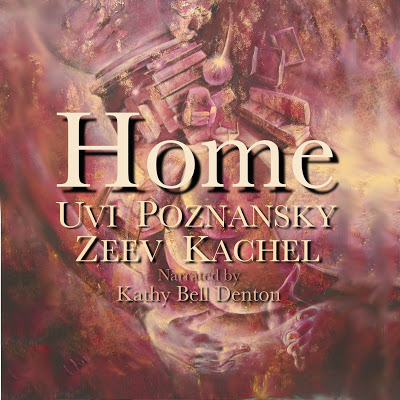
Audiobook coming soon
Treat yourself to a gift--ebook FREE today!
Get Home
★ Audiobook ★ Ebook ★ Print ★
 Wow! So happy! Just got this messsage, about the fourth one of my books to go audio:
Wow! So happy! Just got this messsage, about the fourth one of my books to go audio:Congratulations, Home is now on sale at audible.com. And we plan to make it available on iTunes and Amazon.com within the next few days.
Check out the list of audiobooks, and don't forget to play the voice clip for each one! Take a listen, here:
My author page on Audible

 As part of the launch event Home, I am announcing a Writing Contest for all who take part in the celebration. Check out the details here:
As part of the launch event Home, I am announcing a Writing Contest for all who take part in the celebration. Check out the details here:Writing Contest

 I plucked a wildflower
I plucked a wildflowerWritten by my father, translated by me
I plucked a wildflower from my resting place
And it was blue, as if it wore my name, my face
But I was startled suddenly by a snake
Who slinked across the path with one tail shake...
Listen to the poem (read for the audiobook edition by Kathy Bell Denton) HERE:

 Are you a member of Audible? Love biblical fiction? Boy are you in luck! As part of the launch event Home, I am announcing a RAFFLE to win a FREE audiobook download of my audiobook, A Favorite Son!
Are you a member of Audible? Love biblical fiction? Boy are you in luck! As part of the launch event Home, I am announcing a RAFFLE to win a FREE audiobook download of my audiobook, A Favorite Son!Here's how:
Win a FREE audiobook in this RAFFLE
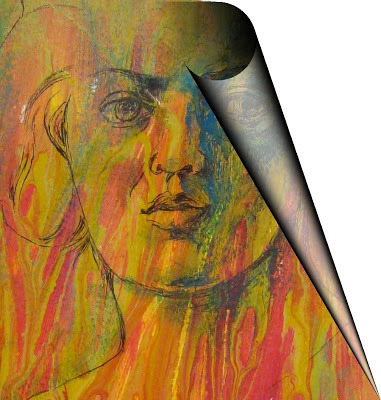
 If you are reading Home I will feature your image at the top of my blog, in the new slideshow feature at the top right.
If you are reading Home I will feature your image at the top of my blog, in the new slideshow feature at the top right.Here's how:
Got Home? Your image here
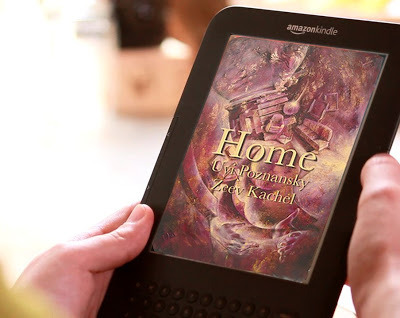
 I'm blessed for the pleasure, blessed for the agony
I'm blessed for the pleasure, blessed for the agonyBlessed for the fear, the pain of it all
In which I was steeped, in this reality
And granted the chance to endure or to fall...
Take a listen to the poem in its entirety (from the audiobook edition of HOME):
I'm Blessed for the Pleasure, Blessed for the Agony
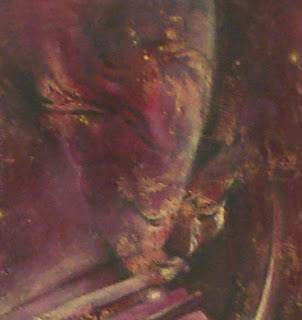
 Renee Pierce Williams is the author of the five-star rated, GCBA-nominated book, Buck the Good Doog. Born and raised in Georgia, she began her seventeen-year career at Aflac, where she held positions in both the Marketing and Legal Documentation divisions of the company. I simply love her ★★★★★ review of my poetry book, Home.
Renee Pierce Williams is the author of the five-star rated, GCBA-nominated book, Buck the Good Doog. Born and raised in Georgia, she began her seventeen-year career at Aflac, where she held positions in both the Marketing and Legal Documentation divisions of the company. I simply love her ★★★★★ review of my poetry book, Home.★★★★★ "HOME" is where the heart is..., September 3, 2013
By Renee Pierce Williams - See all my reviews
This review is from: Home (Kindle Edition)
This is the second book I have read by the multi-talented, poet, artist and author, Uvi Poznansky. After the passing of her father; author, poet and artist, Zeev Kachel, Poznansky stumbles upon years of his unpublished poems, plays and stories. She spends a year translating his works from his native Hebrew to English.
This is a father-daughter collaboration by two very gifted artists. Both share the very unique and rare gift of capturing their reader by painting their characters with a pen. If you have lived, you or someone close to you, has experienced some of the darkness this life has to offer. Poznansky does an outstanding job of translating her father's pain and loneliness into relatable works of art.
This book is both a lovely tribute and another fine display of talent.

 I invite you to read the lovely entries by writers and poets from around the world. The theme is "Longing for a place we can no longer reach", in celebration of Home.
I invite you to read the lovely entries by writers and poets from around the world. The theme is "Longing for a place we can no longer reach", in celebration of Home.Then cast your vote for your favorite entry in the writing contest!

 I’ll be yours, you’ll be mine
I’ll be yours, you’ll be mineBring a flower, uncork the wine
Come home tomorrow, don’t be late
We’ll have our moment, we’ll have a date!
Our Home event is fast coming to its high point (Fri 09/06 @ 2:00pm PST.)
Don't miss the Grand Finale!
☻ We’ll celebrate with bread, wine, cheese, desserts... Virtually delicious!
☻ I’ll be nnouncing the 3 front-runners of the WRITING CONTEST, plus--
☻ Surprise!--a wildcard winner, picked by me out of a hat, plus--
☻ I’ll be announcing the winner of the RAFFLE

★★★★★
" Written in an elegant style, this publication contains
both poems and story-like sections of prose.
It's lyrical, expressive, and poignant"
Treat yourself to a gift
★ Audiobook ★ Ebook ★ Print ★
 If you have missed my Launch event for the audiobook edition of Home, here is a glimpse of what happened:
If you have missed my Launch event for the audiobook edition of Home, here is a glimpse of what happened:




★★★★★
" Written in an elegant style, this publication contains
both poems and story-like sections of prose.
It's lyrical, expressive, and poignant"
Treat yourself to a gift
★ Audiobook ★ Ebook ★ Print ★
 Reparations
ReparationsPoem by my father (translated by me)
You're asking me to put here in writing, once more,
All that I lost, my esteemed counselor?
To list in detail, then describe and refine
And bring two witnesses tomorrow to sign?
My father's gold watch--I could just hear the sound
Had three lids that were shining
Reflected in it I could see us, standing around
All faces aglow and rejoicing.
The watch also had a heavy gold chain
Coiled twice over, over his vein
The tips of its hands gave a hint of a spark
Shooting green glow, right into the dark
It ticked, counting years for each girl and boy
Marking seasons, holidays, morning and night
I remember Sabbath candles flickering with joy
Sparkling brightly, like starlight.
You're asking me to record, on paper to pour
All that I lost, my esteemed counselor?
There was an old synagogue my grandpa had built
Burning scrolls, flying ash, dying spirit
Ancient Torah aflame, letters lifting, all gilt
Thou shall not kill, shall not steal, shall not covet
There was my sister. She was delicate, tender
In her eyes I remember a twinkle
Her name was Batia, my beloved little sister
She grew up--and then--it was simple:
She grew up and married, gave birth to a son
with a blue glint in his eyes, and a dimple
And blond hair, like a pure 'Aryan'--
The murderers, they threw him right into the Nile
There were aunts, there were uncles, boys and girls in our midst
The murderers decreed: they should not exist
You're asking me to record, on paper to pour
All that I lost, my esteemed counselor?
I demand to return, reopen that door
Find parents and sister, each girl and boy
Back there in that synagogue, with that spirit of yore
Sabbath candles aflame, father's voice filled with joy.
It's not property I ask for, not mere pieces of land--
Hebrew school, friends around, all of us in one band
With hope that inspired to survive, to withstand.
Bring the murderers to trial, that is what I demand.
You will not understand; it's of no great import--
I demand that which had been cut short
HOME is now available on Amazon--and at a reduced price!
Take a listen:
✿ Audio ✿ print ✿ ebook ✿

 Wow, what a lovely, spot on review for my poetry book, Home:
Wow, what a lovely, spot on review for my poetry book, Home:★★★★★ A Ballad with a Flair, September 10, 2013
By Warrior Princess (Karmoy, Norway) - See all my reviews
Amazon Verified Purchase
I was penetrated by a pouring rain
And for a moment, somehow, I felt alive again
Sensing me, the worms began to rave
I plucked a wildflower from my grave.
These four lines written by Zeev Kachel and translated by his daughter Uvi Poznansky resonated with me like no other poetry in English ever had. They seemed to have reached something deep in my soul. I was surprised and enchanted and kept reading, enjoying every line of this emotional collection and wondering what it was that kept drawing me in. Eventually, after reading through Uvi's blog, I figured out what that mysterious soul connection was: when Uvi was little, her father used to read to her the poetry of Pushkin, a beloved Russian poet and one of my favorite writers of all time, in Russian. She didn't understand the words until he translated them for her, but the rhythm, the sound, and the soul of his poetry must have reached Uvi through the linguistic barrier. Quite amazing. But let me share a few of my favorite lines from "Home."
Things are no longer
Where things ought to be
Who is this stranger
Is it still me?
These lines, written by Uvi, appeal to me because of the profound meaning behind their apparent simplicity. As life moves forward and we get busy with everyday activities, we tend not to notice the passage of time, only to stop one day and suddenly realize how much life has changed around us and how much we ourselves have changed.
Another emotion that I was drawn to is that of life-affirming defiance no matter what life's circumstances are. Just take a look at this stanza (also by Uvi):
Sing out a ballad of passion and hate
Sing it out as you drown, and ignore that date
Someone may notice, may listen out there
So quicken the pounding, sing out with a flair
My interpretation of this idea of "singing a ballad" is that music and song are some of the purest, most ancient, and most raw ways to express emotions "with a flair."
As I read further and got to the section of the book that contains poetry written by Uvi's father, Zeev Kachel (and translated by Uvi), I could see the similarities in their spirit. In the two lines below, the idea that life is not nearly as sweet and innocent as we often expect, is expressed eloquently and concisely:
Ma, why did you fool me, what was it for,
When you sang me a lullaby, not a song of war?
And more life-affirming defiance in these next lines:
In the distance, you seem to spot a shelter
But all I see is an endless universe
Come on, Troika! Snow sparkles on your lashes
Let's charge to the horizon, let us charge our course!
What I see here is the spirit of independence, the idea of finding your own way, of moving forward fearlessly with no thought of resting, stopping, hiding, or seeking refuge from adversity - strong emotions eloquently expressed. The feelings behind these poems reminded me of the poetry of Anna Akhmatova, a famous Russian modernist poet who lived through and wrote about Stalinist terror.
This poetry collection by Uvi and her father shines with the same spirit of defiance in the face of a great loss, combines lyrical poetry with a strong voice, and presents rhymes that reverberate with the rhythm of our hearts and our lives. Highly recommended.

 Wow, what a lovely, spot on review for my poetry book, Home:
Wow, what a lovely, spot on review for my poetry book, Home:★★★★★ A Ballad with a Flair, September 10, 2013
By Warrior Princess (Karmoy, Norway) - See all my reviews
Amazon Verified Purchase
I was penetrated by a pouring rain
And for a moment, somehow, I felt alive again
Sensing me, the worms began to rave
I plucked a wildflower from my grave.
These four lines written by Zeev Kachel and translated by his daughter Uvi Poznansky resonated with me like no other poetry in English ever had. They seemed to have reached something deep in my soul. I was surprised and enchanted and kept reading, enjoying every line of this emotional collection and wondering what it was that kept drawing me in. Eventually, after reading through Uvi's blog, I figured out what that mysterious soul connection was: when Uvi was little, her father used to read to her the poetry of Pushkin, a beloved Russian poet and one of my favorite writers of all time, in Russian. She didn't understand the words until he translated them for her, but the rhythm, the sound, and the soul of his poetry must have reached Uvi through the linguistic barrier. Quite amazing. But let me share a few of my favorite lines from "Home."
Things are no longer
Where things ought to be
Who is this stranger
Is it still me?
These lines, written by Uvi, appeal to me because of the profound meaning behind their apparent simplicity. As life moves forward and we get busy with everyday activities, we tend not to notice the passage of time, only to stop one day and suddenly realize how much life has changed around us and how much we ourselves have changed.
Another emotion that I was drawn to is that of life-affirming defiance no matter what life's circumstances are. Just take a look at this stanza (also by Uvi):
Sing out a ballad of passion and hate
Sing it out as you drown, and ignore that date
Someone may notice, may listen out there
So quicken the pounding, sing out with a flair
My interpretation of this idea of "singing a ballad" is that music and song are some of the purest, most ancient, and most raw ways to express emotions "with a flair."
As I read further and got to the section of the book that contains poetry written by Uvi's father, Zeev Kachel (and translated by Uvi), I could see the similarities in their spirit. In the two lines below, the idea that life is not nearly as sweet and innocent as we often expect, is expressed eloquently and concisely:
Ma, why did you fool me, what was it for,
When you sang me a lullaby, not a song of war?
And more life-affirming defiance in these next lines:
In the distance, you seem to spot a shelter
But all I see is an endless universe
Come on, Troika! Snow sparkles on your lashes
Let's charge to the horizon, let us charge our course!
What I see here is the spirit of independence, the idea of finding your own way, of moving forward fearlessly with no thought of resting, stopping, hiding, or seeking refuge from adversity - strong emotions eloquently expressed. The feelings behind these poems reminded me of the poetry of Anna Akhmatova, a famous Russian modernist poet who lived through and wrote about Stalinist terror.
This poetry collection by Uvi and her father shines with the same spirit of defiance in the face of a great loss, combines lyrical poetry with a strong voice, and presents rhymes that reverberate with the rhythm of our hearts and our lives. Highly recommended.

 In honor of International Day of Peace--September 21--here is a story of a child whose family family escapes from war:
In honor of International Day of Peace--September 21--here is a story of a child whose family family escapes from war:"There he sits, pressed in between bundles and things that keep rattling around him, on top of a horse-driven wagon. Looking up at his parents he can sense something big, something fearful and unspoken casting a shadow over them; and they bend their heads together over him and his sister. He can see an endless line in front, an endless line in back—horses and wagons, wagons and horses as far as the eye can see—all advancing towards the same gray, unclear horizon, all escaping towards the same destination: Unknown.
The sun rises in front of the wagons, and sets behind them. Towns appear and disappear. Rivers pass by, then forests, brick houses, motels. In Minsk they stop. He finds the three-story hotel quite fascinating at first, especially the curved rail of the staircase, which is meant, no doubt, for sliding down and yelling at the top of your voice. Of course, landing down on your butt, he finds out, is an entirely different matter—and so is the harsh, unforgiving look cast down at him by the hotelkeeper.
They settle down for the night. In the rented room, his mommy blesses the Sabbath candles. Her hands are tightly clasped, her eyes closed. And early the next morning they mount the wagon again, and the journey goes on in the dim light, guided by nothing but an instinct to survive, farther and farther away from home. Squinting at the rising sun, Zeev finds it more and more difficult to keep his eyes open. His mind is going numb listening to the wheels as they spin and turn, spin and turn, beating incessantly against the mud.
Cold rain starts coming down at him, sheet after sheet, and streaming in the same direction is the wet mane of the horse. Its head keeps bobbing up and down, up and down in front. When will it end? Where can they go?
Many days pass by—he cannot count them any more—until, one evening, as they travel along the river, a big town comes into view, closer and closer against the smoky blue backdrop of the Ural Mountains.
This, his daddy tells him, is Saratov."
My father was born 1912, and the story above is how I imagine the story of the family, escaping their home on the eve of World War I, which started on August 1, 1914 with the German declaration of war on Russia. Always an army town, the fortress of Brisk was now flooded with Russian military personnel, and many private houses were requisitioned to accommodate them. Late in July 1915, with the installation of new hospitals in town, it became clear that the front was fast approaching Brisk De-Lita.
Rumors of evacuation were heard and the Russian army was to fortify the east bank of the Bug River; but when the German army captured Warsaw on August 4, the Fort Commandant gave the civilian population in Brisk three days to evacuate. Imagine the panic amongst the Jews, who owned most of the businesses, when they had to abandon their belongings and flee for their lives.
When the German army marched into Brisk on August 25, it was a town without people, but with a great abundance of merchandise in the stores. And on the eve of Yom Kippur, the 18th of September, they entered Slonim, a neighboring city, and pressed on into Russia. By that time, the family was already far away from the frontline.
A long, dragged out journey had begun.
My ink-on-paper below is my way of illustrating the ugliness of war. Two figures holding whips are standing over a defiant, seated figure, threatening to cause him harm. In reality, all three figures were sketched looking at the same model.

The story is included in Home:
✿ Audio ✿ print ✿ ebook ✿
 New poetry series: Contemporary Writers of Poland
New poetry series: Contemporary Writers of PolandThe newest in an outgoing series dedicated to the courageous people of Poland who fought always to defend and preserve the Polish identity and cultural heritage throughout long periods of oppression - so beautifully represented here in Polish Literature Anthologies. I had the honor of being invited to contribute several of my poems:
Contemporary Writers of Poland 2000-2014

 There must be some magic dust in the air every time I visit my dear friend, Brian M. Hayden, and leave a few words on his blog. Within a day, each one of my three guest posts garnered an incredible amount of 'readers' likes. Brian tells me The Cyclical Process of Writing was the highest visited post, with over 1,100 visits in a single day. Check them out:
There must be some magic dust in the air every time I visit my dear friend, Brian M. Hayden, and leave a few words on his blog. Within a day, each one of my three guest posts garnered an incredible amount of 'readers' likes. Brian tells me The Cyclical Process of Writing was the highest visited post, with over 1,100 visits in a single day. Check them out: Home
215 likes
The Cyclical Process of Writing
199 likes
“The Descent into a Different Realm”
287 likes
Funny thing is, I wish I knew how this happens, because then I could repeat this feat with my next post... My best guess is this: here is a case of two authors combining forces, one opening the door for another, creating an inviting environment--and therefore, the friends and followers of both of them come in too, and they do it in great numbers!
Still, who knows... Your guess is as good as mine!

Books mentioned in this topic
Home (other topics)Home (other topics)
Home (other topics)
Home (other topics)
Home (other topics)
More...




I dreamt a dream that I'm still a child,
Here's home.
In a minute the door will open
Letting in my parents, my sister.
I'm foolishly beguiled!
They were all swept off by a gust, into the wild
I'm alone
No longer a child.
When my father wrote these words, which to me are profoundly heart wrenching, he still knew the difference between dream and reality. The door, he realized, would never open, and it remains there as a poetic symbol of hope, of yearning for something that can never happen, not only because of his advanced age--but also because his parents and his sister perished during the holocaust.
But during the last year of his life, that border between what is real and what is a dream, a poetic symbol, became thinner and thinner, and thus more illusive to him. He would crouch by that door, banging his fist upon it and begging his mommy to open that door. Then, as a mercy to his sanity, he passed away at the age of ninety four.
This was, and still is, quite painful to me. Having witnessed it I wrote several pieces--some poems, some short stories--about the thinning of the border in his mind. These pieces are all inspired by my vision of his life, as I saw it in retrospect when I came to mourn for him. This vision also inspired my oil painting which became the cover of the book, Home. Here is a detail of it, showing the door and his armchair, ascending in the air above the turmoil, the grief...
So here is an excerpt from one of the poems in Home, which highlights the vision of the door as a thinning border:
That door sealed him off, away from all danger
Except from the depth of the danger within
No one could intrude here, except for the stranger
Who would carry him off to where his end would begin—
The poet, who’d mourned the loss of his mother
Would then, somehow, be reduced to a child
He would crouch at the threshold, and call, call, call, call her
Knock, knock, knock at the door; no more held back, but wild
And here, another excerpt, this time from a short story about my father:
"And then, trying to ignore the ticking, the loud, insistent ticking of the clock from the adjacent kitchen, you too would, perhaps, start sensing a presence. Voices would be coming from a different place, a place within. A faint footfall… A soft laughter... Who is there? He glances nervously at the entrance door. Is it locked? Can a stranger get in? Then—quite unexpectedly—the fear subsides and for the first time, gives way to something else. Something wells up in his throat. Why, why is the door locked?
He feels a sudden urge to crawl down, get to that threshold, and cry. Mommy! Open the door! Let me in, mommy! Let me come home! But for now, he can still hold it in. He forces himself to turn away from that door. Somehow it feels lighter in the dark. The bareness of this space, which was once adorned with rich Persian rugs, colorful oil paintings and fine furnishings, is more bearable this way. So is the weight of loneliness."